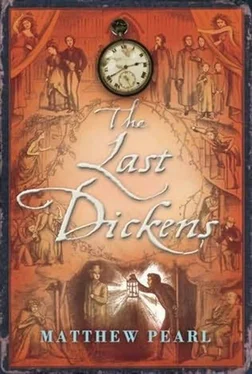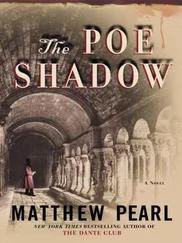“Where were you?” Dolby said to Tom accusingly. “They wanted to tear me to p-p-pieces!”
Tom looked over his shoulder but knew that the woman with the notebook would be gone. There would be no point now in getting his employer's dander up. “I apologize, Mr. Dolby. I was inspecting the bonfires.”
“You should have been at the ready.”
“I am sorry, sir.”
Dolby straightened out his suit and neckcloth, though he remained the model of dishevelment. “Well, let's get on with it. There's at least two thousand dollars to be taken from this crowd, if there's a dollar! Isn't that the American way?”
AFTER A SET of readings in New York, the schedule required Dickens, Dolby, and staff in Boston. Because the snow had closed the railroad, they waited around until Saturday in New York, where they were subjected to the papers’ columns condemning the events at the Brooklyn ticket sales and blaming a “hotheaded Irishman” employed by Dickens for starting the near riot. This fact was confirmed by an unimpeachable “bewigged, buckled, three corner hatted witness,” the George Washington speculator who urged the police to arrest Tom at once. Meanwhile, Dickens had entered the depths of a worsening cold-“English colds are nothing compared to those of this country,” he proclaimed gravely-but Dolby privately worried it was worse, perhaps influenza. Another long train ride now would not help. Dickens signaled Henry Scott to remove a flask from the traveling case as soon as they took their seats.
Henry, meanwhile, prayed for Dickens before each journey by rail.
“Is anything wrong, Henry?” Tom asked him once when he had first noticed this display.
“Staplehurst!” Henry replied gloomily.
“Staplehurst?”
“Yes, only that. If there were but no Staplehurst at all-no June the ninth-perhaps the Chief should not be such a sad man.”
“He still seems rather gay to me,” Tom noted, “for what you call a sad man.”
“Don't you read the papers? Don't you know anything at all, Tom Branagan?”
He described how approximately two years earlier, on June 9, 1865, Dickens had nearly been killed. A terrible train accident near the village of Staplehurst in Kent. The railway tracks covering a bridge had been removed for repair without alerting the oncoming trains. Dickens and his party were aboard the “tidal train” from France, which, reaching the portion of missing track, careened off the bridge.
Dickens had lifted Nelly Ternan and her mother from their dangling first-class car to safety, and then the novelist climbed to the ravine below where he pulled out as many victims as he could. Despite his brave efforts, ten people died that day as the novelist watched helplessly. Dickens climbed back into the dangling train compartment twice during the ordeal. First to retrieve brandy for the suffering patients below. Then he realized however dangerous it was he had to climb back in again. Inside his coat was a new installment of the novel he was writing, Our Mutual Friend , the pages of which were dirty but unharmed. Forever after, whenever the novelist stepped foot in a railway car, a steamer, even a hackney cab, he could not help but be reminded that here could be our final passage on this earth. Brandy helped nerve him on these occasions.
“Staplehurst,” Henry repeated, and finished his story with a silent prayer. “Amen,” he said softly.
“Amen,” Tom echoed.
A stove heated the car they sat in on the way back to Boston, but it could not be said whether it made the compartment more comfortable or miserable when combined with the number of passengers and the rough motion. The nine-hour express route was slowed considerably by the rivers in Stonington and New London, both on the way through Connecticut. At each of these places the train navigated onto a ferry to cross the river, the passengers free to stay aboard or to explore the ship and eat at its restaurant. Dickens stayed on the train during these ferry rides, even when a nearby American war vessel unfurled a British flag and struck up a rendition of “God Save the Queen” in his honor. Dickens merely watched from the window.
His spirits seemed especially restrained on this passage as he played a slow game of three-handed cribbage with Tom and Henry.
“I remember,” Dickens said with sudden excitement to nobody in particular, “it was my first visit to America when-yes, that was when!-when I first practiced the art of mesmerism! Strange to say the railways seem to have stood still while most other things in this country have been changing for the better. They were terrible then and terrible now.”
“Mesmerism, Chief?” Tom asked. “You've done it yourself?”
“Ah, Branagan, spiritualism is nothing but a humbug, but the un-fathomed ties between man and man are as real, and as dangerous, as this very train being planted on a rickety boat.” Dickens described how he used lessons from the famed English spiritualist John Elliot-son to mesmerize his wife when in Pittsburgh in 1842. “I admit to feeling some alarm when Catherine fell into a magnetic sleep in under six minutes, though I was excited enough by the slap-up success to repeat it the following evening. When I returned to England I tried it on Georgy-my children's auntie, my sister-in-law, and my best and truest friend. Georgy, the sweetest soul, became almost violent over it.” Dickens laughed luminously at this memory but then was silent and spiritless again, perhaps at the thought of Catherine. He never would talk about Catherine, the mother of his eight children, even as he never really could talk about Nelly Ternan, and certainly would not stand for anyone else talking about either.
“Well, perhaps Mr. Scott has heard all this before,” he went on. “What do you say to a trial of my mesmerism skills, Mr. Branagan?”
“On me?” Tom asked.
“Great fun, Chief!” Henry called out.
“Come, come,” said Dickens with a businesslike air. “I have magnetized unbelievers before. I have the perfect conviction that I could magnetize a frying pan! You won't remember any of it when you wake, anyway.”
Tom sighed and submitted as Dickens passed his hand in front of Tom's eyes until they closed, then began to move his thumbs in a transverse motion across his face. Suddenly, he stopped, looking into Tom's face with an odd twinkle in his eye. The train was rocking back and forth.
“Chief?” Henry asked.
Tom opened his eyes to find the novelist's nostrils were dilated and his eyes restless. Dickens was no longer trying to mesmerize him at all. The jolts of the train had pulled his mind somewhere else.
“Perhaps, Branagan, this isn't the time to-” Dickens clutched the arms of his seat and turned pale white. Beads of sweat formed across his forehead every time the train shook, and his lips were trembling as if he were the one under a spell. This state of suspended animation lasted several minutes before the novelist returned to life and took a long pull from his flask. The three dropped the project of mesmerism and returned to the cribbage game just where it had been left. Tom was baffled.
After getting out at their station, Henry Scott whispered to Tom, as his only explanation, “You see? Staplehurst!”

THIS WAS THE MOST anticipated event of the reading tour. Dickens was to give his reading of A Christmas Carol on Christmas Eve at Boston's Tremont Temple. More than three thousand dollars of tickets had been purchased for the performance in less than two hours. “It is,” Dolby boasted with grandeur, when counting out the money from the sale back at Parker's, “as though the Chief invented Christmas with the Carol. ”
Читать дальше













